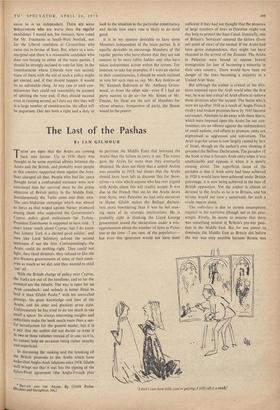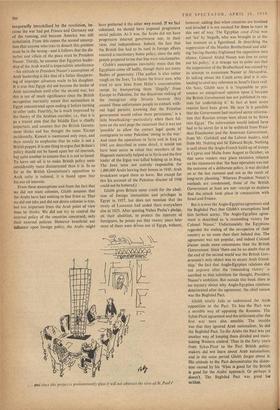The Last of the Pashas
By IAN GILMOUR
With the British change of policy over Cyprus, the Turks are out of the headlines, and so for the moment are the Israelis. The way is open for an Arab comeback; and nobody is better fitted to lead it than Glubb Pasha,* with his unrivalled prestige, his great knowledge and love of the Arabs, and his clear and pleasant prose style. Unfortunately he has tried to do too much in too small a space. Its always interesting insights and reflections make the book much more than a use- ful introduction for the general reader, but it is a pity that the author did not decide to write it in two or three volumes instead of in one; as it is, he cannot help on occasion being rather sketchy and superficial.
In discussing the making and the breaking of the British promises to the Arabs which have bedevilled Anglo-Arab relations since 1918, Glubb well brings out that it was less the signing of the Sykes-Picot agreement (the Anglo-French plan * BRITAIN AND THE ARABS. By Glubb Pasha. (Hodder and Stoughton, 30s.) to partition the Middle East) that betrayed the Arabs than the failure to carry it out. The treaty gave the Arabs far more than they eventually obtained. He does not think that a united Arabia was possible in 1918, but thinks that the Arabs should have been left to discover this for them- selves—a view which anyone who has ever argued with Arabs about this will readily accept. It was due to the French that we let the Arabs down over Syria; over Palestine we had only ourselves to blame. Glubb makes the Balfour declara- tion more bewildering, than it was by not mak- ing more of its strategic implications. He is probably right in thinking the Lloyd George government issued the declaration under a mis- apprehension about the number of Jews in Pales- tine at the time-7 per cent. of the population-- but even this ignorance would not have been sufficient if they had not thought that the presence of large numbers of Jews in Palestine might one day help to protect the Suez Canal. Ironically, one of Britain's 'betrayals' ensured the failure (from our point of view) of the second. If the Arabs had been given independence, they might not have objected to the arrival of the Zionists. The Arabs in Palestine were bound to oppose Jewish immigration for fear of becoming a minority in their own country. There would have been no danger of the Jews becoming a majority in a United Arab State.
But although the author is critical of the divi- sions imposed upon the Arab world after the first war, he is no less critical of Arab efforts to remove those divisions after the second, The States which were set up after 1918 as a result of Anglo-French rivalry and broken promises have by 1945 become sacrosanct. Attempts to do away with these States, which were imposed upon the Arabs for our con- venience, are an offence against the independence of small nations, and efforts to promote unity are stigmatised as aggression and subversion. The Arab urge for union is now largely caused by fear of Israel, though on the author's own showing it preceded the Balfour Declaration. The paradox of the book is that it favours Arab unity when it was. unattainable and opposes it when it is slowly coming about. The superficial cause of the paradox is that if Arab unity had been achieved in 1920 it would have been achieved under British patronage; it is now being achieved in the face of British opposition. Yet the author is almost as devoted to the Arabs as he is to Britain, and his history would not turn a somersault for such a crude reason alone.
The volte-face is due to certain assumptions implicit in his narrative (though not in his post- script). Firstly, he seems to assume that there was something natural in Britain's pre-war posi- tion in the Middle East. But for one power to dominate the Middle East as Britain did before the war was only possible because Russia was 'I don't care how little you're paying. I still call it a snub.' temporarily Immobilised by the revolution, be- cause the war had put France and Germany out of the running, and because America was still isolationist. From this comes the second assump- tion that anyone who tries to disturb this position must be in the wrong—and it follows that the dis- turber and villain of the piece must be President Nasser. Thirdly, he assumes that Egyptian leader- ship of the Arab world is imperialistic interference —his attitude to President Nasser's assumption of Arab leadership is like that of a father disapprov- ing of improper advances made to his daughter. It is true that Egypt did not become the leader of Arab nationalism until after the second war, but this is not of much significance since the British occupation inevitably meant that nationalism in Egypt concentrated upon ending it before turning to other tasks. Fourthly, he is much impressed by the theory of the Arabian corridor, i.e., that it is as a transit area that the Middle East is chiefly important, and assumes that the British Govern- ment thinks and has thought the same. Except incidentally, Kuwait is mentioned only once, and then merely to emphasise that its ruler is not a British puppet. It is one thing to argue that Britain's policy should not be based upon her oil interests, but quite another to assume that it is not so based. To leave out oil is to make British policy seem considerably more disinterested than it is. In so far as the British Government's opposition to Arab unity is rational, it is based upon fear for our oil interests.
From these assumptions and from the fact that we did not want colonies, Glubb assumes that the Arabs have had nothing to fear from us. That we did not take and did not desire colonies is true, but less important from the Arab point of view than he thinks. We did not try to control the internal policy of the countries concerned, only their external policies. However beneficial our influence upon foreign policy, the Arabs might have preferred it the other way round. If we had colonised, we should have imposed progressive social policies. As it was, the Arabs did not have progressive internal government nor, in their view, real independence. Indeed, the fact that the British line had to be toed in foreign affairs ensured a reactionary home policy, since the only people prepared to toe that line were reactionaries.
Glubb's assumptions inevitably mean that the Egyptians come off badly, though there are many flashes of generosity. (The author is also rather rough on the Jews. To blame the brave men, who tried AO save Jews from Hitler's concentration camps by transporting them 'illegally' from Europe to Palestine, for the disastrous sinking of the immigrant ship Struma because they caused 'these unfortunate people to embark with- out legal permits, knowing that the Palestine government would refuse them permission,' is a little breathtaking—particularly when there fol- lows on the next page the statement that it was not 'possible' to allow the correct legal quota of immigrants to enter Palestine 'owing to the war.' And since the operations in Syria and in Iraq in 1941 are described in some detail, it would not have been amiss to relate that members of the Haganah materially helped us in Syria and the first leader of the Irgun was killed helping us in Iraq. The Jews were not entirely responsible for 1,000,000 Arabs leaving their homes in 1948; Arab broadcasts urged them to leave. But except for this his account of the Palestine disaster of 1948 could not be bettered.) Glubb gives Britain some credit for the aboli- tion of foreign immunities and privileges in Egypt in 1937, but does not mention that the treaty of Lausanne had ended them everywhere else in 1923. After quoting Nahas Pasha's pledge, on their abolition, to protect the interests of foreigners, he points out that twenty years later most of them were driven out of Egypt, without, . . and since this project is predominantly glass it will not obstruct the view of St. Paul's' however, adding that when countries are bombed and invaded it is not unusual for them to react in this sort of way. The Egyptian coup (fetal was not 'led' by Neguib, who was brought in at the last moment as a figurehead. In describing the suppression 'of the Muslim Brotherhood and add- ing 'having thereby frightened the opposition into silence, General Abdul Nasser was free to carry out his policy,' it is strange not to point out that the suppression of the Brotherhood was caused by its attempt to assassinate Nasser at Alexandria. In talking about the Czech arms deaf it is mis- leading-to omit any reference to Israel's Gaza raid. On Suez, Glubb says it is 'impossible to pro- nounce an unequivocal opinion upon it because the British Government has not published its rea- sons for undertaking it.' In fact at least seven reasons have been given. He says 'it is possible that the Government had received secret informa- tion that Russian troops were about to be flown into Egypt.' The information would indeed have had to be secret for it to be withheld from Presi- dent Eisenhower and the American Government, from Mr. Gaitskell and the Labour leaders, and from Mr. Nutting and Sir Edward Boyle. Nothing is said about the Anglo-French build-up of troops in Cyprus and Malta from August to October, so that some readers may place excessive reliance on the statements that 'the Suez operation was not the outcome of a deliberate policy, it was decided on at the last moment and not as the result of long-term planning.' Whereas President Nasser's methods are condemned, those of the British Government at Suez are not—except to deplore that the attack took place in conjunction with Israel and France.
But it is over the Anglo-Egyptian agreement and the Baghdad Pact that Glubb's assumptions lead him farthest astray. The Anglo-Egyptian agree- ment is described as 'a resounding victory for Colonel Nasser.' Unfortunately the Egyptians regarded the ending of the occupation of their country as no more than their belated due. The agreement was not popular, and indeed Colonel Nasser made more concessions than the British Government. Since 'there can be no doubt that at the end of the second world war the British Gov- ernment's only object was to secure Arab friend- ship,' the fact that Anglo-Egyptian relations did not improve after the 'resounding victory' is ascribed to that substitute for thought, President, Nasser's ambition. But outside this book there is no mystery about why Anglo-Egyptian relations deteriorated after the agreement; the chief reason was the Baghdad Pact.
Glubb totally fails to understand the Arab opposition to the Pact. To him the Pact was a sensible way of opposing the Russians. The Sykes-Picot agreement and the settlement after the first war were also sensible. The trouble was that they ignored Arab nationalism. So did the Baghdad Pact. To the Arabs the Pact was yet another way of keeping them divided and main- taining Western control. Thus in the forty years from Sykes-Picot to the Pact British policy- makers did not learn about Arab nationalism; and in the same period Glubb forgot about it. His attitude to the Pact demonstrates the distor- tion caused by his 'What is good for the British is good for the Arabs' approach. Or perhaps it doesn't. The Baghdad Pact was good for neither.















































 Previous page
Previous page